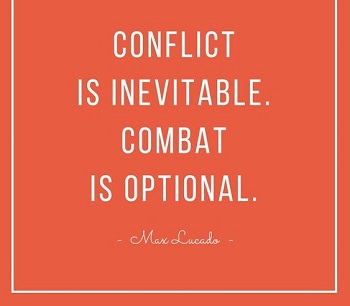The Right way to Resolve Conflict #45
Conflict. No one likes it; some provoke or evoke it, and some avoid it like the plague. The word itself triggers people and causes a reaction; often protection, defensiveness, or counter-attack are the methods. We brace for it and nervously laugh or fidget when it is present or needing to happen. It can be sensed and felt well before it is discussed and most of us dread dealing with it.
When it happens and doesn’t go well, people are hurt. The people having the conflict and those witnessing it. With leadership teams, it’s rarely subtle, after all they didn’t become leaders by being shy or reserved. The impact is felt by all who are present and when it becomes personal, it’s even worse. There are lingering wounds and grudges, performance suffers, judgment persists and hardens into characterizations of who people are as a result.
After a conflict like this, most team members make mistakes like:
- Waiting too long to apologize or reconcile
- Having “private” one-on-one conversations with only the main offenders to resolve the situation
- Leaving the meeting, storming or sneaking out, handling it in writing not face to face
- Going to other members to “side” with them and gather support for their argument
- Quitting their job
- Gossiping
- Pretending it didn’t happen
None of these work. Many people have offered the argument that you handle the resolution one-on-one as it is “shaming” to offer an apology or reconcile in front of others – they believe you should do it one-on-one.
That’s completely backward. When unhealthy conflict happens in front of a team and is tolerated, there is no reason reconciliation should be handled privately. If the conflict happens between two people, fine. Resolve it with those two people privately.
There is an impact to every team member when conflict occurs. If it’s healthy conflict, it’s not a problem. Healthy conflict is how leaders argue for the right solution or push for an answer. When it becomes unhealthy and personal, we can’t tolerate, accept or ignore it. The impact is felt by everyone present, not just those fighting.
Bottom line, when it happens with the team, heal it with the team. Your vulnerability, willingness to apologize, stay in a tough dialogue and resolve the situation is how you lead. It is powerful and valuable to all present.
Categories: Sue's Daily Blog


